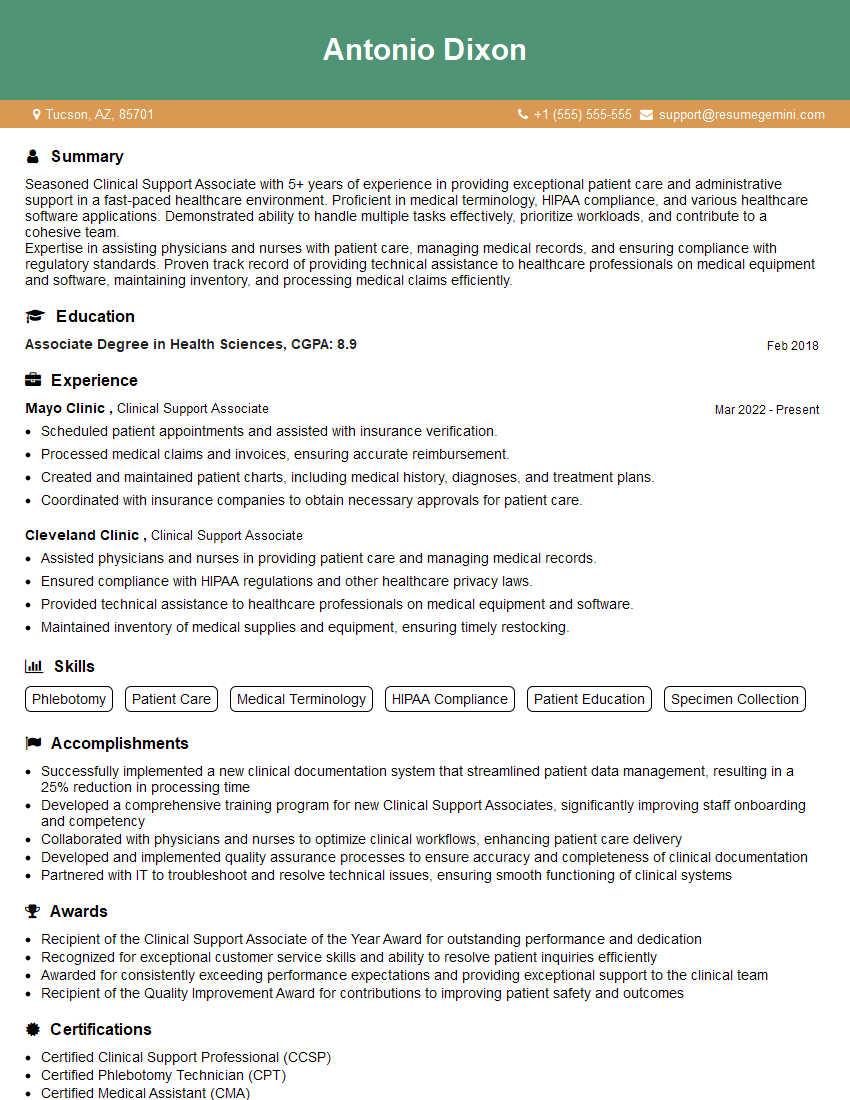Are you gearing up for a career shift or aiming to ace your next interview? Look no further! We’ve curated a comprehensive guide to help you crack the interview for the coveted Clinical Support Associate position. From understanding the key responsibilities to mastering the most commonly asked questions, this blog has you covered. So, buckle up and let’s embark on this journey together
Acing the interview is crucial, but landing one requires a compelling resume that gets you noticed. Crafting a professional document that highlights your skills and experience is the first step toward interview success. ResumeGemini can help you build a standout resume that gets you called in for that dream job.
Essential Interview Questions For Clinical Support Associate
1. What is the role of a Clinical Support Associate?
As a Clinical Support Associate, my primary responsibilities include:
- Providing technical assistance to healthcare professionals on medical devices and equipment.
- Troubleshooting and resolving issues related to device functionality.
- Training healthcare staff on proper device usage and maintenance.
- Gathering and analyzing clinical data to identify trends and improve device performance.
- Ensuring compliance with regulatory requirements and industry standards.
2. Describe your experience in providing technical support for medical devices.
Troubleshooting and Resolution
- Diagnosed and resolved complex technical issues with medical devices.
- Collaborated with engineers to identify and implement solutions promptly.
Training and Education
- Developed and delivered comprehensive training programs on device usage and maintenance.
- Provided hands-on demonstrations and simulations to enhance learning.
3. How do you stay up-to-date on the latest advancements in medical technology?
To ensure my knowledge remains current, I engage in continuous professional development:
- Attend industry conferences and workshops.
- Read medical journals and research publications.
- Participate in online training and certification programs.
- Network with other healthcare professionals.
4. What is your understanding of regulatory compliance in the medical device industry?
I am thoroughly familiar with the regulatory landscape:
- FDA regulations and guidelines for medical device development and marketing.
- ISO 13485 and other international standards for quality management systems.
- HIPAA and other data privacy laws.
5. How do you manage multiple tasks and projects simultaneously?
I effectively manage my workload through:
- Prioritizing tasks and setting deadlines.
- Using project management tools to track progress and avoid bottlenecks.
- Delegating tasks to team members when necessary.
- Communicating regularly with stakeholders to ensure alignment.
6. What are your communication and interpersonal skills like?
I am an excellent communicator with strong interpersonal skills:
- Effectively convey technical information to both technical and non-technical audiences.
- Build and maintain positive relationships with healthcare professionals, colleagues, and customers.
- Collaborate effectively in cross-functional teams.
7. How do you handle challenging or stressful situations?
In challenging situations, I remain calm and collected:
- Analyze the situation objectively and develop logical solutions.
- Communicate effectively to defuse tension and build consensus.
- Seek support from colleagues or supervisors when necessary.
8. What is your approach to problem-solving?
I follow a systematic problem-solving approach:
- Identify and define the problem clearly.
- Gather relevant data and analyze the root cause.
- Explore and evaluate potential solutions.
- Implement the best solution and monitor its effectiveness.
9. What is your experience with data analysis and reporting?
I am proficient in:
- Analyzing clinical data to identify trends and patterns.
- Preparing and presenting reports to communicate findings and recommendations.
- Using statistical tools and techniques to support decision-making.
10. What are your career goals and how does this role align with them?
My long-term career goal is to become a leader in the healthcare technology industry:
- This role provides a solid foundation for my future growth.
- It allows me to contribute directly to improving patient outcomes.
- I am excited about the opportunity to learn and grow within this organization.
Interviewers often ask about specific skills and experiences. With ResumeGemini‘s customizable templates, you can tailor your resume to showcase the skills most relevant to the position, making a powerful first impression. Also check out Resume Template specially tailored for Clinical Support Associate.
Career Expert Tips:
- Ace those interviews! Prepare effectively by reviewing the Top 50 Most Common Interview Questions on ResumeGemini.
- Navigate your job search with confidence! Explore a wide range of Career Tips on ResumeGemini. Learn about common challenges and recommendations to overcome them.
- Craft the perfect resume! Master the Art of Resume Writing with ResumeGemini’s guide. Showcase your unique qualifications and achievements effectively.
- Great Savings With New Year Deals and Discounts! In 2025, boost your job search and build your dream resume with ResumeGemini’s ATS optimized templates.
Researching the company and tailoring your answers is essential. Once you have a clear understanding of the Clinical Support Associate‘s requirements, you can use ResumeGemini to adjust your resume to perfectly match the job description.
Next Step:
Armed with this knowledge, you’re now well-equipped to tackle the Clinical Support Associate interview with confidence. Remember, preparation is key. So, start crafting your resume, highlighting your relevant skills and experiences. Don’t be afraid to tailor your application to each specific job posting. With the right approach and a bit of practice, you’ll be well on your way to landing your dream job. Build your resume now from scratch or optimize your existing resume with ResumeGemini. Wish you luck in your career journey!
